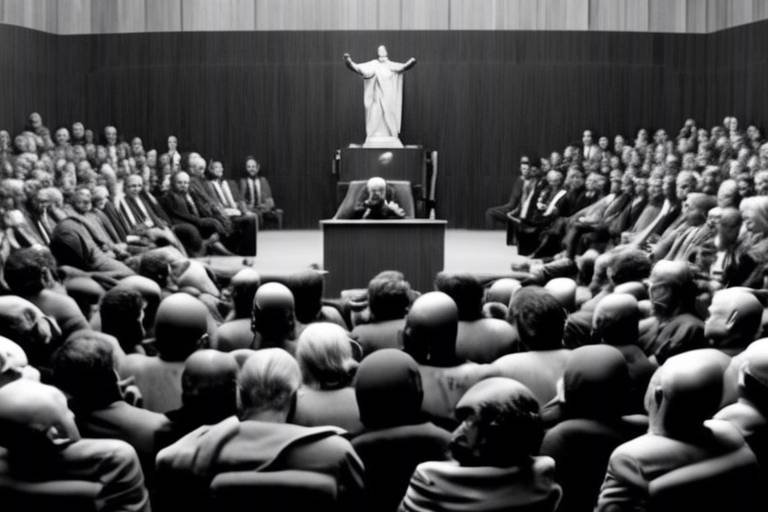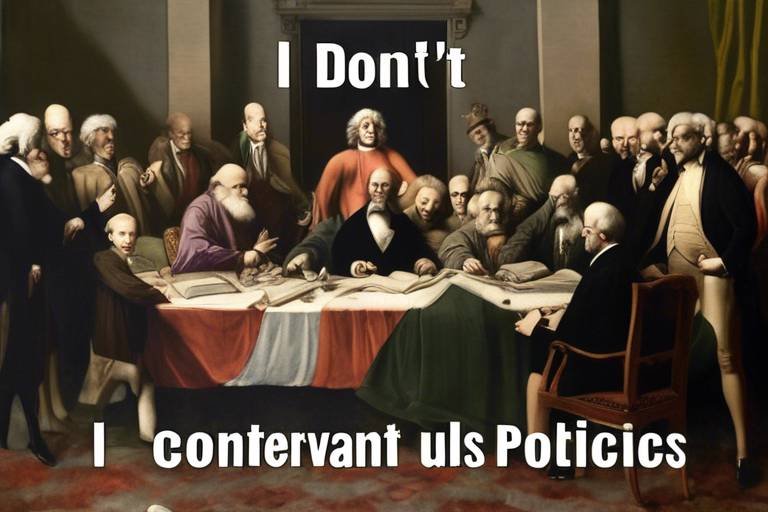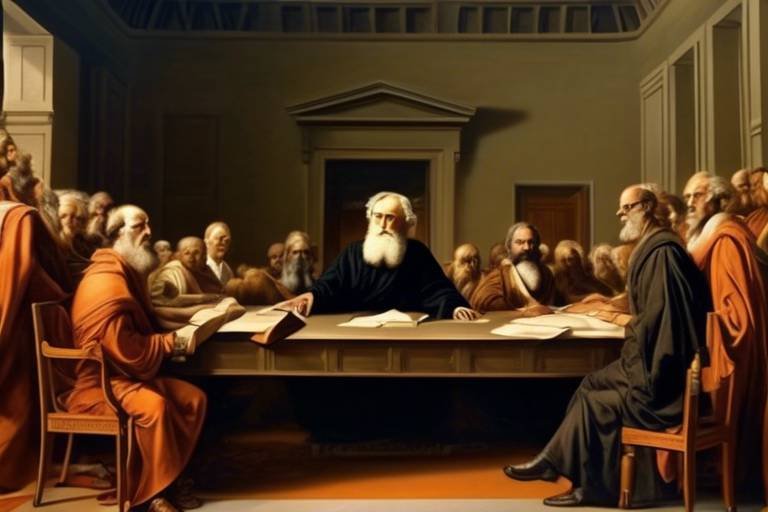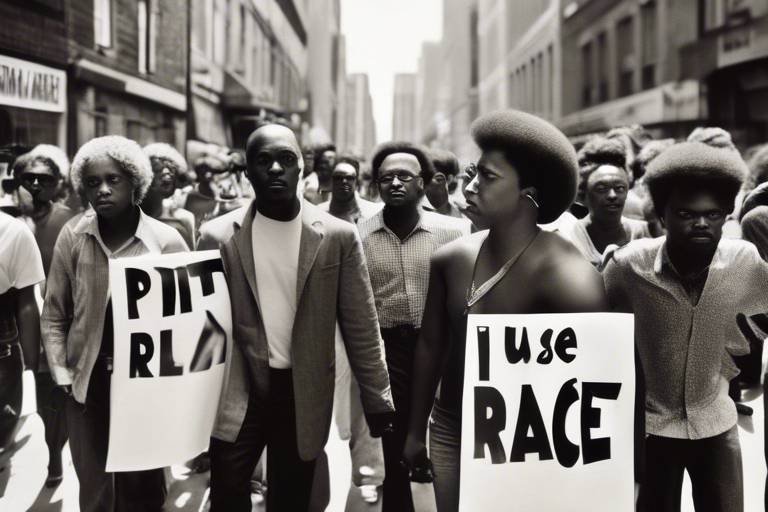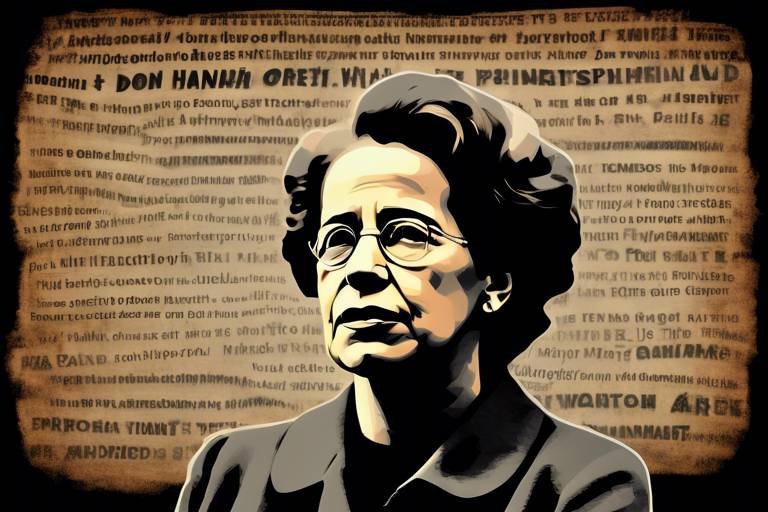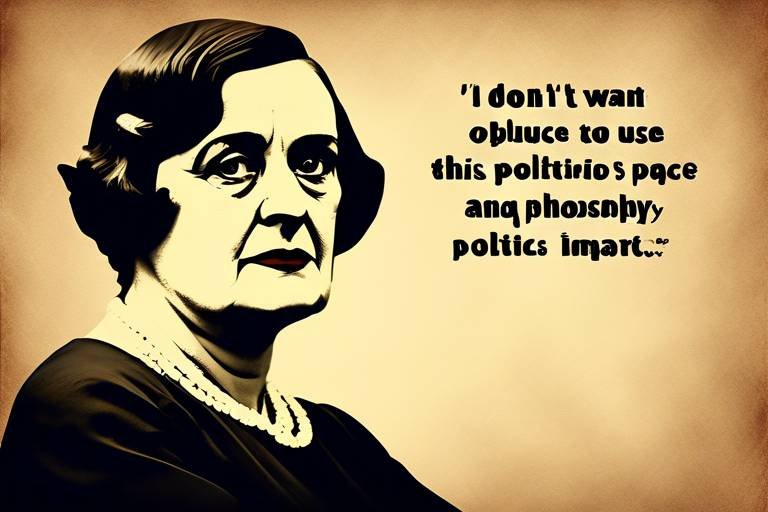Philosophy's Role in Achieving Political Democracy
In an age where political landscapes are constantly shifting, the role of philosophy in achieving and sustaining political democracy is more crucial than ever. Philosophy serves as the backbone of our understanding of democracy, offering the critical frameworks necessary for evaluating our political systems. At its core, democracy is not just about the act of voting; it embodies a deeper commitment to liberty, equality, and justice. These principles, deeply rooted in philosophical thought, guide us in shaping a society where every voice counts, and every citizen has a stake in the political process.
When we think about democracy, we often picture a ballot box and a voting booth. However, the essence of democracy transcends these physical symbols. It is about fostering an environment where critical thinking thrives, enabling citizens to engage in political discourse meaningfully. Imagine a society where individuals are not just passive recipients of information but active participants, equipped with the tools to question, analyze, and challenge the status quo. This is the kind of democracy that philosophy helps to cultivate.
Philosophy encourages us to reflect on our values and the ethical implications of our choices. It invites us to consider questions like: What does it mean to be free? How do we ensure that everyone has equal opportunities? In addressing these questions, we begin to understand that the health of our democracy hinges on our ability to engage with these philosophical ideas. By doing so, we can create a political landscape that not only respects individual rights but also prioritizes the common good.
Furthermore, the intersection of philosophy and democracy is evident in the way we approach education. An educational system that emphasizes philosophical inquiry equips students with the ability to think critically about their roles as citizens. It prepares them to not only participate in elections but also to hold their leaders accountable. In this way, philosophy acts as a catalyst for political engagement, encouraging a populace that is informed, ethical, and ready to advocate for justice.
As we navigate the complexities of modern governance, it becomes clear that philosophy is not just an abstract discipline but a practical tool for enhancing democratic practices. By fostering a culture of critical thought and ethical reasoning, we can ensure that our political systems evolve to meet the needs of all citizens. Ultimately, the relationship between philosophy and democracy is one of mutual reinforcement, where each discipline informs and strengthens the other, paving the way for a more just and equitable society.
- What is the significance of philosophy in democracy?
Philosophy provides the foundational principles of liberty, equality, and justice that guide democratic practices and encourage critical thinking among citizens. - How does education influence democratic engagement?
Education instills democratic values and equips individuals with the tools to analyze political systems, fostering active participation in governance. - Why is ethical decision-making important in politics?
Ethical considerations ensure that political decisions reflect moral values and prioritize the common good over individual interests. - How does social justice relate to democracy?
True democracy cannot exist without addressing inequalities and advocating for marginalized voices, ensuring that all perspectives are valued.

The Foundations of Democratic Philosophy
The journey into the realm of democratic philosophy is akin to peeling back the layers of an onion—each layer reveals deeper insights into the principles that govern our societies. At its core, democratic philosophy is built upon the **foundational ideas** of liberty, equality, and justice. These concepts have been shaped and molded by the thoughts of influential philosophers throughout history. Think about it: without these guiding principles, the very essence of democracy would be lost, much like a ship without a compass.
One cannot discuss the foundations of democratic philosophy without mentioning the profound impact of thinkers such as **Plato**, **Aristotle**, and **John Locke**. Plato's vision of an ideal state, articulated in his work "The Republic," emphasized the importance of justice and the role of philosopher-kings. He believed that a just society could only emerge when rulers were wise and virtuous. Aristotle, on the other hand, took a more pragmatic approach. His examination of various political systems in "Politics" laid the groundwork for understanding the balance of power and the importance of civic engagement. Locke's ideas on natural rights and government by consent further solidified the belief that individuals possess inherent rights that must be protected, a notion that resonates deeply in modern democratic thought.
These philosophical giants did not merely theorize; they sparked a **revolution of ideas** that would eventually culminate in the democratic systems we see today. For instance, the Enlightenment period brought forth the idea that reason and individualism should be at the heart of governance. This shift in thinking encouraged people to question authority and advocate for their rights, setting the stage for revolutions across the globe. The **American Revolution** and the **French Revolution** were both inspired by these philosophical underpinnings, showcasing how democratic ideals can mobilize entire populations toward the pursuit of freedom and equality.
Moreover, the **social contract theory**, as articulated by philosophers like Rousseau and Hobbes, plays a crucial role in understanding the relationship between individuals and the state. Rousseau’s concept of the "general will" emphasizes that democracy is not just about majority rule; it is about representing the collective interests of the community. This idea challenges us to think critically about how we define and achieve the common good in our political systems.
In modern times, the foundations of democratic philosophy continue to evolve. The dialogue surrounding **human rights**, **social justice**, and **global citizenship** reflects the ongoing relevance of philosophical inquiry in shaping democratic ideals. As we grapple with contemporary issues such as climate change, inequality, and technological advancements, the philosophical frameworks established by our predecessors provide valuable insights into how we can navigate these challenges. Ultimately, the foundations of democratic philosophy serve not only as historical markers but also as living concepts that inspire us to strive for a more just and equitable society.
- What are the key principles of democratic philosophy?
The key principles include liberty, equality, and justice, which form the bedrock of democratic societies.
- Who are some influential philosophers in the development of democratic thought?
Notable philosophers include Plato, Aristotle, John Locke, and Jean-Jacques Rousseau, each contributing unique perspectives on governance and society.
- How does philosophy influence modern democracy?
Philosophy shapes our understanding of justice, rights, and the role of citizens, guiding contemporary debates on governance and ethical decision-making.

Critical Thinking and Political Engagement
In today's fast-paced world, where information is at our fingertips, the ability to engage in critical thinking has become more crucial than ever. But what exactly does this mean for political engagement? Critical thinking is not just about analyzing facts; it's about questioning the status quo, evaluating arguments, and making informed decisions. When citizens cultivate these skills, they become empowered to participate meaningfully in the democratic process. Imagine a society where every individual not only votes but does so with a deep understanding of the issues at hand. This is the kind of engagement that critical thinking fosters.
Moreover, critical thinking equips individuals with the tools to dissect political rhetoric and identify biases in media. In an age where misinformation spreads like wildfire, being able to sift through the noise is essential. Citizens who think critically can challenge misleading narratives and advocate for truth and transparency. They are less likely to fall prey to manipulation and more inclined to demand accountability from their leaders. In essence, critical thinkers are the backbone of a healthy democracy.
Education plays a pivotal role in nurturing critical thinking skills. Schools and universities must prioritize teaching students how to think critically about political issues. This involves not just rote memorization of facts but fostering an environment where debate, discussion, and diverse perspectives are encouraged. When students learn to analyze different viewpoints, they develop a more nuanced understanding of complex issues, preparing them for active participation in civic life.
Education is the bedrock of democracy, acting as a catalyst for critical thinking and political engagement. It’s not enough to simply inform citizens about their rights; they must also be taught how to engage with these rights responsibly. A well-rounded education instills a sense of responsibility in citizens, encouraging them to participate in political discourse actively. When individuals understand the significance of their voice, they are more likely to engage in discussions, attend town hall meetings, and even run for office themselves.
Philosophical education goes beyond traditional subjects; it encourages individuals to question authority and explore the ethical implications of political decisions. By engaging with philosophical texts and ideas, citizens can develop a framework for understanding their rights and responsibilities within a democratic society. This type of education fosters an inquisitive mindset, prompting individuals to ask, "What is just?" or "How can we improve our community?" Such questions are vital for a thriving democracy.
To nurture future generations of informed citizens, it is essential to develop curricula that emphasize democratic principles and ethical reasoning. Schools should incorporate lessons on civic responsibility, critical analysis, and the importance of participation in governance. By doing so, we prepare students not just to be passive recipients of information but active contributors to society. A curriculum that encourages students to engage with political issues prepares them for the complexities of modern democracy.
In conclusion, critical thinking is a fundamental component of political engagement. It empowers citizens to navigate the complexities of political discourse and make informed decisions. By prioritizing education that fosters these skills, we can cultivate a generation of active, responsible citizens who are equipped to uphold the values of democracy.
- What is critical thinking? Critical thinking is the ability to analyze information objectively and evaluate different perspectives before forming a judgment.
- Why is critical thinking important in politics? It allows individuals to make informed decisions, question misinformation, and engage thoughtfully in political discourse.
- How can education promote critical thinking? By incorporating discussions, debates, and diverse viewpoints into the curriculum, education can nurture critical analysis and reasoning skills.

The Role of Education in Democracy
Education is not just about memorizing facts or passing exams; it’s the bedrock of a thriving democracy. Imagine a society where every individual is equipped with the knowledge to think critically and engage in meaningful discussions about their rights and responsibilities. This is the essence of democratic education. It empowers citizens to not only understand the political landscape but also to actively participate in shaping it. Without a solid educational foundation, democracy risks becoming a hollow shell, devoid of the vibrant discourse that fuels its growth.
At the heart of this educational framework lies the concept of critical thinking. This isn't merely a buzzword; it's a vital skill that enables individuals to analyze information, question assumptions, and challenge the status quo. When citizens are trained to think critically, they become more than just passive recipients of information; they evolve into active participants in the democratic process. They can dissect political rhetoric, evaluate policies, and make informed decisions at the ballot box. Think of critical thinking as a compass guiding individuals through the murky waters of political discourse, helping them navigate towards truth and justice.
Moreover, education instills a sense of ethical responsibility. It teaches individuals the importance of making decisions that reflect not just personal interests but also the collective good. In a democracy, where the majority often holds sway, it’s crucial that citizens understand the implications of their choices. Ethical education encourages individuals to consider the broader impact of their actions, fostering a culture of empathy and social responsibility. This is particularly important in a world where misinformation can spread like wildfire, leading to decisions that may harm the community.
To effectively prepare future generations for democratic engagement, educational institutions must focus on developing curricula that emphasize democratic principles. This includes not only the history and mechanics of democracy but also the importance of civic engagement and social justice. For instance, integrating lessons on historical movements for civil rights can inspire students to advocate for change in their communities. A curriculum that reflects democratic values ensures that students are not just passive learners but active contributors to society.
Furthermore, the role of education extends beyond the classroom. Community programs and workshops can provide additional platforms for citizens to engage with democratic processes. These initiatives can serve as a bridge, connecting individuals with local governance and fostering a sense of belonging. When citizens feel connected to their political systems, they are more likely to participate actively, whether through voting, attending town hall meetings, or engaging in advocacy.
In conclusion, education is the lifeblood of democracy. It cultivates informed and engaged citizens who are equipped to navigate the complexities of political life. By prioritizing critical thinking and ethical reasoning in educational settings, we can nurture a generation that values democracy not just as a system of governance, but as a way of life. As we look to the future, it is imperative that we invest in educational initiatives that promote active citizenship and uphold the principles of justice and equality for all.
- Why is critical thinking important in a democracy? Critical thinking enables citizens to analyze information, question assumptions, and engage meaningfully in political discourse.
- How can education promote social justice? Education can teach individuals about inequalities and empower them to advocate for marginalized communities, ensuring diverse voices are heard.
- What role do community programs play in democratic education? Community programs provide additional platforms for citizens to engage with local governance and foster a sense of belonging and responsibility.

In the ever-evolving landscape of political democracy, philosophical education emerges as a beacon of hope, guiding citizens towards a more informed and engaged society. Imagine a world where individuals possess the tools to question authority, understand their rights, and actively participate in the democratic process. This is not just a lofty ideal; it is a tangible outcome of a robust philosophical education. By equipping citizens with critical thinking skills and ethical reasoning, we create a populace that is not only aware of their rights but also understands the responsibilities that come with them.
Philosophical education encourages individuals to delve deep into the fundamental questions of existence, morality, and justice. It invites them to engage in discussions that challenge their preconceived notions and broaden their perspectives. For instance, when students are exposed to the ideas of great philosophers such as John Locke, who championed the concept of natural rights, or Jean-Jacques Rousseau, who emphasized the social contract, they begin to comprehend the essence of democracy itself. They learn that democracy is not merely a system of governance but a way of life that requires active participation and vigilance.
Moreover, the integration of philosophical education into the curriculum can significantly influence the development of critical citizens. Imagine a classroom where students are encouraged to debate ethical dilemmas, analyze political theories, and reflect on their societal roles. This environment fosters a culture of inquiry and dialogue, essential for a thriving democracy. When students engage in such discussions, they not only enhance their reasoning abilities but also cultivate a sense of empathy and responsibility towards their community.
To illustrate the impact of philosophical education, consider the following table that highlights key components of a philosophical curriculum designed for democratic engagement:
| Component | Description |
|---|---|
| Critical Thinking | Encourages questioning and analysis of political and ethical issues. |
| Ethical Reasoning | Promotes understanding of moral values and their application in public life. |
| Debate and Discussion | Fosters skills in articulating viewpoints and engaging with differing opinions. |
| Historical Context | Provides insights into the evolution of democratic principles and practices. |
In conclusion, a strong foundation in philosophical education is essential for nurturing informed and responsible citizens. It empowers individuals to navigate the complexities of political life, ensuring that they are not passive observers but active participants in shaping their communities. As we invest in the education of future generations, we must prioritize the integration of philosophical inquiry, fostering a culture that values critical thought and ethical engagement. This is how we pave the way for a more vibrant and resilient democracy.
- What is philosophical education? - It is an educational approach that emphasizes critical thinking, ethical reasoning, and the exploration of fundamental questions about existence and society.
- Why is philosophical education important for democracy? - It equips citizens with the skills needed to engage meaningfully in political discourse and make informed decisions, fostering active participation in democratic processes.
- How can philosophical education be implemented in schools? - By integrating discussions on ethics, political theory, and critical analysis into the curriculum, schools can cultivate a generation of informed citizens.

Curriculum Development for Democratic Values
Developing a curriculum that emphasizes democratic values is crucial for nurturing informed citizens who actively participate in their political systems. A well-structured curriculum should not only cover the basics of democracy but also delve into the principles of liberty, equality, and justice. These foundational concepts can help students understand their roles in a democratic society, fostering a sense of responsibility and engagement.
To achieve this, educators must integrate various subjects that promote critical thinking and ethical reasoning. For instance, social studies classes can explore the historical context of democratic movements, while philosophy courses can challenge students to question authority and consider the implications of their beliefs. This interdisciplinary approach ensures that students grasp the complexities of democracy and appreciate the importance of their voices in shaping societal norms.
Moreover, incorporating real-world applications into the curriculum can significantly enhance students' understanding of democratic values. This can be done through:
- Debates on current political issues, allowing students to articulate their viewpoints and engage with opposing perspectives.
- Community service projects that encourage students to contribute to their communities, fostering a sense of civic duty.
- Mock elections to simulate the electoral process, helping students understand the significance of their votes.
Additionally, educators should prioritize inclusivity in curriculum development. This means ensuring that diverse voices and perspectives, particularly those from marginalized communities, are represented. By doing so, students can learn about the importance of social justice and the need for equitable representation in democratic processes. A curriculum that reflects a variety of experiences will not only enrich students’ learning but also prepare them to advocate for themselves and others in a diverse society.
In conclusion, the development of a curriculum that emphasizes democratic values is not just about imparting knowledge; it is about shaping the future of democracy itself. By equipping students with the skills to think critically, engage ethically, and act inclusively, we can cultivate a generation of citizens who are not only aware of their rights but are also committed to upholding the principles of democracy. The responsibility lies with educators, policymakers, and communities to create educational environments that inspire and empower the leaders of tomorrow.
1. Why is curriculum development important for democratic values?
Curriculum development is essential as it lays the foundation for students to understand and engage with democratic principles, ensuring they become informed and responsible citizens.
2. How can educators promote critical thinking in the classroom?
Educators can promote critical thinking by encouraging open discussions, facilitating debates, and incorporating real-world scenarios that challenge students to analyze and evaluate information.
3. What role does inclusivity play in teaching democratic values?
Inclusivity ensures that all voices are heard and valued, allowing students to learn from diverse perspectives, which is crucial for fostering a comprehensive understanding of democracy and social justice.

Ethics in Political Decision-Making
When we think about politics, it’s easy to get caught up in the whirlwind of power plays, elections, and policies. But at the heart of every decision made in the political arena lies a fundamental question: What is the right thing to do? Ethics in political decision-making is not just an abstract concept; it’s a vital component that shapes the very fabric of our society. This ethical framework guides politicians, policymakers, and citizens alike in determining what is just and fair. Without a solid ethical foundation, decisions can easily become skewed, prioritizing personal gain over the common good.
In essence, ethical considerations in politics serve as a compass, pointing us towards actions that reflect our shared values. They compel leaders to think beyond their immediate interests and consider the broader implications of their policies. For instance, when a government proposes a new law, it should not only focus on the economic benefits but also weigh the social consequences. Are the marginalized communities being considered? Is there a risk of deepening existing inequalities? These questions highlight the necessity of ethics in crafting policies that truly benefit society.
Moreover, the role of ethics in political decision-making can be illustrated through a few key principles:
- Accountability: Politicians must be held accountable for their actions. Ethical standards demand transparency and responsibility, ensuring that leaders are answerable to their constituents.
- Integrity: Upholding integrity is essential for trust in political systems. When leaders act ethically, they foster a culture of honesty and reliability.
- Equity: Policies should be designed to promote fairness and justice. This means considering the needs of all citizens, especially those who are often overlooked.
To further illustrate the importance of ethics in political decision-making, let’s consider a hypothetical scenario. Imagine a city facing a budget crisis. The mayor has to decide whether to cut funding for public education or public safety. An ethical approach would require the mayor to evaluate not just the immediate financial implications but also the long-term effects on the community’s well-being. Cutting education funding may save money in the short term, but it could lead to a less educated populace, ultimately harming the city’s future. On the other hand, prioritizing education might mean finding alternative funding sources or making cuts elsewhere that do not compromise public safety.
In conclusion, as we navigate the complex world of politics, we must remember that ethics should be at the forefront of decision-making. It is not merely a guideline but a necessity for fostering a democratic society that values justice, equity, and the common good. By embedding ethical considerations into political processes, we can create a system that not only serves the interests of the few but uplifts the entire community.
- Why is ethics important in politics? Ethics ensures that political decisions are made with consideration for justice and the common good, rather than personal gain.
- How can citizens promote ethical decision-making in politics? Citizens can advocate for transparency, hold leaders accountable, and engage in discussions about ethical implications of policies.
- What are some examples of ethical dilemmas in politics? Examples include budget cuts to essential services, balancing economic growth with environmental protection, and addressing social inequalities.

Social Justice and Democracy
When we think about democracy, it’s easy to imagine voting booths, political debates, and the hustle and bustle of civic engagement. However, at the heart of true democracy lies a critical component that often gets overlooked: social justice. This concept is not just a buzzword; it’s a fundamental pillar that supports the very structure of democratic societies. Without addressing issues of inequality and advocating for the voices of the marginalized, democracy risks becoming a hollow shell, devoid of real meaning and purpose.
Social justice is about ensuring that all individuals have equal access to opportunities, rights, and resources. This means recognizing and dismantling the barriers that prevent certain groups from fully participating in the democratic process. It’s not enough to simply have a system where everyone can vote; we must also ensure that every vote carries equal weight and that every voice is heard. Imagine a world where your background, race, or economic status doesn’t dictate your political power—it’s a world where democracy thrives, and that’s the promise of social justice.
One of the key elements of social justice is the philosophy of justice. Philosophers like John Rawls have significantly influenced how we think about fairness in society. Rawls proposed that a just society is one where the least advantaged members benefit as much as possible. This idea challenges us to evaluate our political systems critically. Are our policies designed to uplift the marginalized? Or do they inadvertently perpetuate existing inequalities? When policymakers prioritize social justice, they create an environment where democracy can flourish, allowing for a more equitable distribution of power and resources.
Moreover, advocacy for marginalized communities is essential in the realm of social justice. It’s not just about recognizing the issues; it’s about actively working to include these communities in the decision-making process. This involves creating platforms where diverse perspectives can be shared and valued. For instance, consider how many voices are often silenced in political discussions. By advocating for these groups, we ensure that our democratic processes are enriched by a multitude of experiences and ideas. This is not only beneficial for those communities but for society as a whole, as it leads to more comprehensive and effective policies.
To illustrate this interconnectedness, let’s look at a few key areas where social justice and democracy intersect:
| Area | Impact on Democracy |
|---|---|
| Economic Inequality | Limits access to political power and representation. |
| Racial Discrimination | Marginalizes voices and undermines the principle of equality. |
| Gender Inequality | Prevents half of the population from fully participating in governance. |
In conclusion, the relationship between social justice and democracy is not just complementary; it’s essential. As we strive for a more just society, we must remember that democracy is most effective when it is inclusive. By addressing inequalities and advocating for those whose voices are often drowned out, we strengthen the very foundation of our democratic systems. The challenge lies in our hands—how can we ensure that every individual, regardless of their background, has a place at the table? This is the question that will shape the future of democracy, and it’s one that we, as engaged citizens, must answer.
- What is social justice? Social justice refers to the equitable distribution of resources, opportunities, and rights within a society, ensuring that all individuals can participate fully in the democratic process.
- How does social justice relate to democracy? Social justice is crucial for a functioning democracy as it ensures that all voices are heard and that marginalized groups have access to political power.
- Why is advocacy important in achieving social justice? Advocacy amplifies the voices of marginalized communities, ensuring their perspectives are included in political discussions and decision-making processes.
- Can democracy exist without social justice? No, true democracy cannot thrive without addressing social justice issues, as inequalities undermine the core principles of equality and representation.

Philosophy of Justice
The philosophy of justice serves as a cornerstone for democratic practices, shaping the way societies perceive fairness and equality. At its core, justice is about ensuring that every individual receives what they are due, whether it be rights, resources, or respect. Think of it as the moral compass that guides our actions and decisions within a community. Just like a well-tuned orchestra, where each instrument plays its part harmoniously, a just society requires that every voice is heard and valued, creating a symphony of diverse perspectives.
Historically, philosophers like Plato, Aristotle, and John Rawls have explored the concept of justice, each offering unique insights that continue to resonate in contemporary discussions. For instance, Plato’s idea of the “just city” emphasizes the importance of a well-ordered society where individuals fulfill their roles for the common good. Aristotle, on the other hand, introduces the notion of distributive justice, which focuses on fair allocation based on merit and need. In modern times, Rawls’ theory of justice as fairness has sparked debates about how to structure a society that prioritizes the least advantaged, prompting us to rethink our policies and practices.
But why does the philosophy of justice matter in a democracy? The answer lies in its ability to inform and guide policymakers. A robust understanding of justice equips leaders with the framework necessary to create laws and policies that reflect moral values and prioritize the common good over individual interests. It challenges them to consider questions such as: Are we treating all citizens fairly? Are marginalized voices being amplified? If democracy is the vessel through which we navigate our collective future, then justice is the map that ensures we stay on course.
Moreover, the philosophy of justice compels us to address systemic inequalities that hinder true democratic engagement. For example, consider the impact of socioeconomic disparities on political participation. When certain groups are consistently marginalized, their voices are drowned out, leading to a skewed representation in decision-making processes. By advocating for justice, we can push for reforms that not only elevate these voices but also enrich the democratic dialogue as a whole. It's like ensuring that every player on a sports team has the opportunity to contribute; a team is only as strong as its weakest link.
In conclusion, the philosophy of justice is not just an academic pursuit; it is a vital component of a thriving democracy. It provides the ethical foundation upon which democratic principles are built, encouraging us to strive for a society where fairness, equality, and respect are not mere ideals but lived realities. As we move forward, let us remember that the quest for justice is ongoing, and it is our collective responsibility to ensure that it remains at the forefront of our democratic endeavors.
- What is the philosophy of justice? The philosophy of justice examines the concepts of fairness, equality, and moral rights within a society, guiding how laws and policies should be structured to ensure that everyone is treated justly.
- How does justice relate to democracy? Justice is essential to democracy as it ensures that all voices are heard and valued, promoting a fair and equitable society where individuals can participate meaningfully in political processes.
- Who are some key philosophers associated with the philosophy of justice? Notable philosophers include Plato, Aristotle, and John Rawls, each contributing unique perspectives on what constitutes a just society.
- Why is addressing inequalities important in a democratic society? Addressing inequalities is crucial because systemic disparities can silence marginalized voices, leading to an unbalanced representation in decision-making and undermining the very essence of democracy.

Advocacy for Marginalized Communities
When we talk about democracy, it's not just a buzzword; it's a commitment to inclusivity and representation. Advocacy for marginalized communities is a critical aspect of this commitment. Imagine a garden where only a few plants thrive while others are neglected. This is akin to our society, where certain voices are amplified, and others are stifled. The essence of true democracy lies in ensuring that every plant—every voice—has the opportunity to grow and flourish. Marginalized communities often face systemic barriers that limit their participation in political processes. These barriers can be economic, social, or even cultural, creating a landscape where their needs and perspectives are overlooked.
Philosophical frameworks play a significant role in understanding and advocating for these communities. By examining concepts such as equity, justice, and representation, we can develop strategies that not only highlight the struggles of marginalized groups but also empower them to take part in shaping their destinies. Advocacy is not just about speaking for others; it's about creating spaces where they can speak for themselves. This can be achieved through various means:
- Community Engagement: Involving marginalized groups in discussions and decisions that affect their lives.
- Policy Reform: Advocating for laws and policies that dismantle systemic inequities.
- Education and Awareness: Raising awareness about the issues faced by marginalized communities and the importance of their voices in democracy.
Moreover, philosophical advocacy emphasizes the importance of listening—truly listening—to the narratives of marginalized individuals. Their experiences are rich with insights that can inform better policies and practices. For instance, when policymakers engage directly with these communities, they can identify the specific challenges they face, which might not be visible from a distance. This relationship fosters a sense of trust and collaboration, essential ingredients for a vibrant democracy.
Furthermore, the philosophical discourse around justice urges us to consider the principles of fairness and equity. It challenges us to ask: Are we creating a society where everyone has a seat at the table? Are we ensuring that the most vulnerable among us are not just heard but also valued? By advocating for marginalized communities, we are not only enhancing their political representation but also enriching our democratic fabric.
As we move forward, it is vital to recognize that advocacy is an ongoing process. It requires continuous engagement, education, and a willingness to adapt to the changing needs of our society. The road to true democracy is paved with the voices of those who have been historically silenced, and it is our responsibility to amplify these voices. In doing so, we not only honor their struggles but also strengthen the very foundations of democracy itself.
Q: Why is advocacy for marginalized communities important in a democracy?
A: Advocacy ensures that all voices are represented, leading to a more equitable society. It helps to address systemic inequalities and fosters inclusive decision-making.
Q: How can individuals get involved in advocacy?
A: Individuals can participate by educating themselves about the issues, joining local advocacy groups, and engaging with their communities to raise awareness.
Q: What role does education play in advocating for marginalized communities?
A: Education is crucial as it empowers individuals with knowledge and critical thinking skills, enabling them to advocate effectively for their rights and needs.

The Future of Democracy and Philosophy
The future of democracy and philosophy is a captivating subject that invites us to ponder how these two realms will evolve together in an increasingly complex world. As we stand at the crossroads of technological advancement and social change, the interplay between philosophical thought and democratic ideals becomes more crucial than ever. Imagine a world where **artificial intelligence** and **big data** shape political landscapes, raising questions about **ethics**, **accountability**, and **representation**. How do we ensure that technology serves the people rather than undermines democratic values?
In this context, philosophy will play a pivotal role in guiding our understanding of **justice**, **freedom**, and **equality**. Philosophers of the future will need to grapple with the implications of emerging technologies on civil liberties. For instance, the rise of **surveillance capitalism** poses ethical dilemmas that demand thoughtful discourse. Are we willing to sacrifice our privacy for security? Can we trust algorithms to make fair decisions? These questions are not just academic; they are fundamental to the survival of democratic societies.
Moreover, as global challenges like **climate change**, **inequality**, and **migration** intensify, philosophical frameworks will be essential in shaping policies that promote social justice. A **philosophy of sustainability** could emerge, emphasizing the interconnectedness of humanity and the planet. This perspective would advocate for policies that prioritize the common good over short-term gains, fostering a sense of global citizenship. As we navigate these challenges, the integration of ethical reasoning into political decision-making will be paramount.
To illustrate the potential future intersections of democracy and philosophy, consider the following table that summarizes key areas where philosophical inquiry can influence democratic practices:
| Area of Influence | Philosophical Inquiry | Democratic Implications |
|---|---|---|
| Technology | Ethics of AI | Accountability in decision-making |
| Social Justice | Philosophy of equity | Policies for marginalized communities |
| Global Citizenship | Sustainability ethics | Long-term policy planning |
| Political Discourse | Critical theory | Informed citizenry and engagement |
As we look to the future, it is clear that the relationship between democracy and philosophy will be characterized by a dynamic interplay of ideas and practices. The challenge lies in ensuring that philosophical discourse remains accessible and relevant to all citizens, not just the academic elite. By fostering a culture of **critical thinking** and **ethical reflection**, we can empower individuals to actively participate in shaping their political realities.
In conclusion, the future of democracy and philosophy is not a predetermined path but a landscape of possibilities. By embracing the **transformative power** of philosophical inquiry, we can cultivate a more inclusive, just, and responsive democratic society. As we navigate this journey, let us remember that philosophy is not merely an abstract pursuit; it is a vital tool for understanding and enhancing the world we live in.
- How can philosophy influence political decision-making?
Philosophy provides ethical frameworks that guide policymakers in making decisions that prioritize the common good and reflect moral values. - What role does education play in fostering democratic values?
Education instills critical thinking skills and encourages active participation, helping individuals understand their rights and responsibilities in a democracy. - Why is social justice important for democracy?
True democracy cannot exist without addressing inequalities and ensuring that marginalized voices are represented and valued in political processes.
Frequently Asked Questions
- What is the role of philosophy in political democracy?
Philosophy plays a crucial role in shaping the principles of political democracy by fostering critical thinking, ethics, and social justice. It provides the foundational ideas that encourage citizens to engage actively in their political systems, ensuring that democracy is not just a form of government but a way of life.
- How does critical thinking contribute to democratic engagement?
Critical thinking empowers individuals to analyze information, question assumptions, and make informed decisions. In a democracy, this skill is vital as it enables citizens to participate meaningfully in political discourse, ensuring that their voices are heard and that they can hold their leaders accountable.
- Why is education important for democracy?
Education is fundamental in instilling democratic values and encouraging active participation. It equips individuals with the knowledge and skills necessary to engage in political processes, understand their rights, and critically assess the actions of those in power.
- What ethical considerations should guide political decision-making?
Ethical considerations in political decision-making ensure that policies reflect moral values and prioritize the common good. This means that decisions should aim to benefit society as a whole, rather than serving individual interests or special groups.
- How does social justice relate to democracy?
Social justice is integral to democracy because true democratic practices cannot exist without addressing inequalities. It emphasizes the need for marginalized voices to be heard, ensuring that all individuals have equal access to rights and opportunities within the democratic framework.
- What is the philosophy of justice?
The philosophy of justice informs democratic practices by guiding policymakers in creating fair and equitable systems. It helps define what is considered just and fair, ensuring that the rights of all individuals are upheld within a democratic society.
- How can advocacy for marginalized communities enhance democracy?
Advocacy for marginalized communities enhances democracy by ensuring that diverse perspectives are included in the political process. This representation is vital for creating policies that reflect the needs and rights of all citizens, fostering a more inclusive and equitable society.
- What is the future of democracy in relation to philosophy?
The future of democracy is likely to be shaped by evolving philosophical ideas that address contemporary challenges. As society changes, philosophical discourse will continue to influence democratic practices, ensuring they remain relevant and effective in promoting justice and equality.

